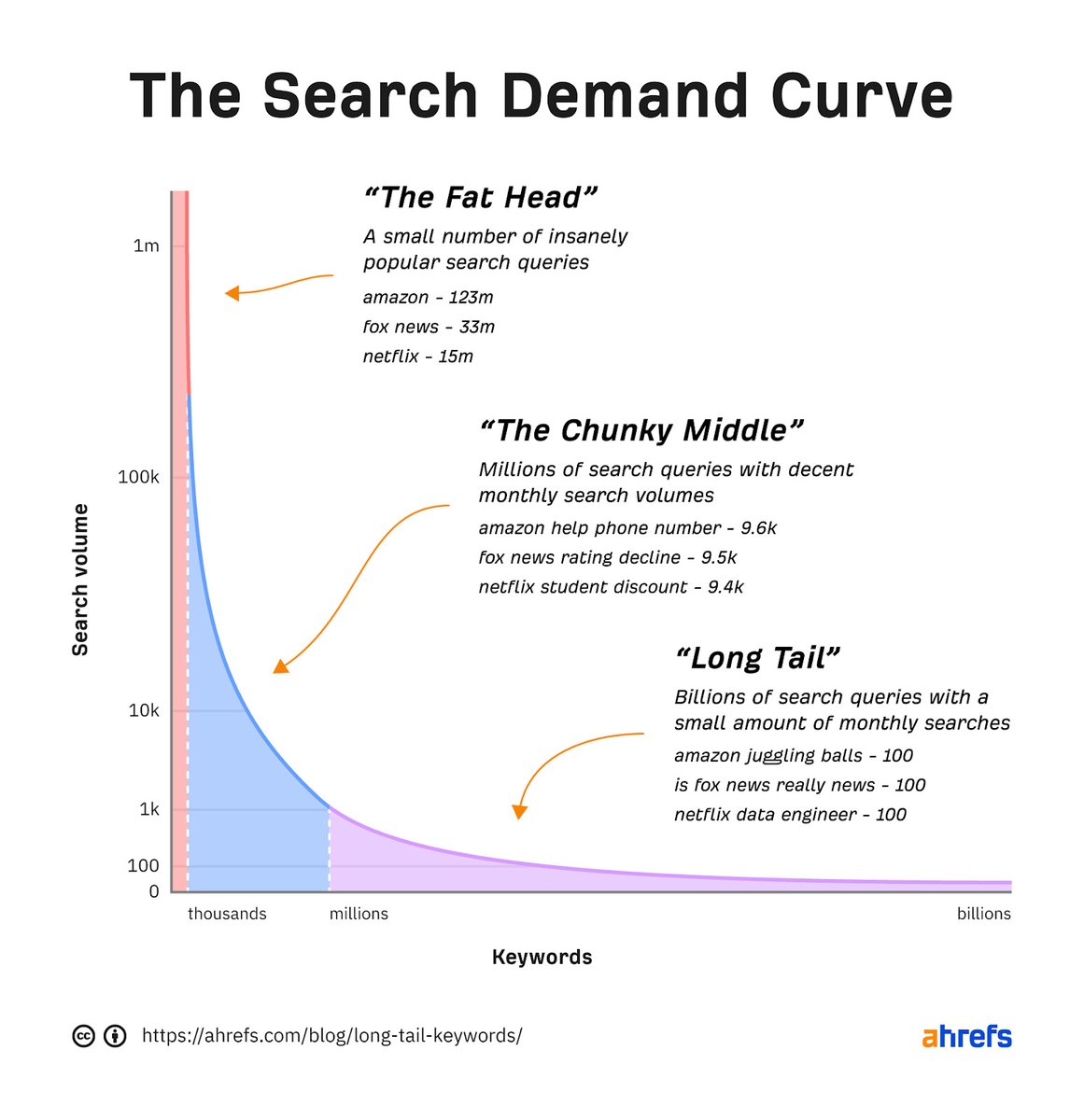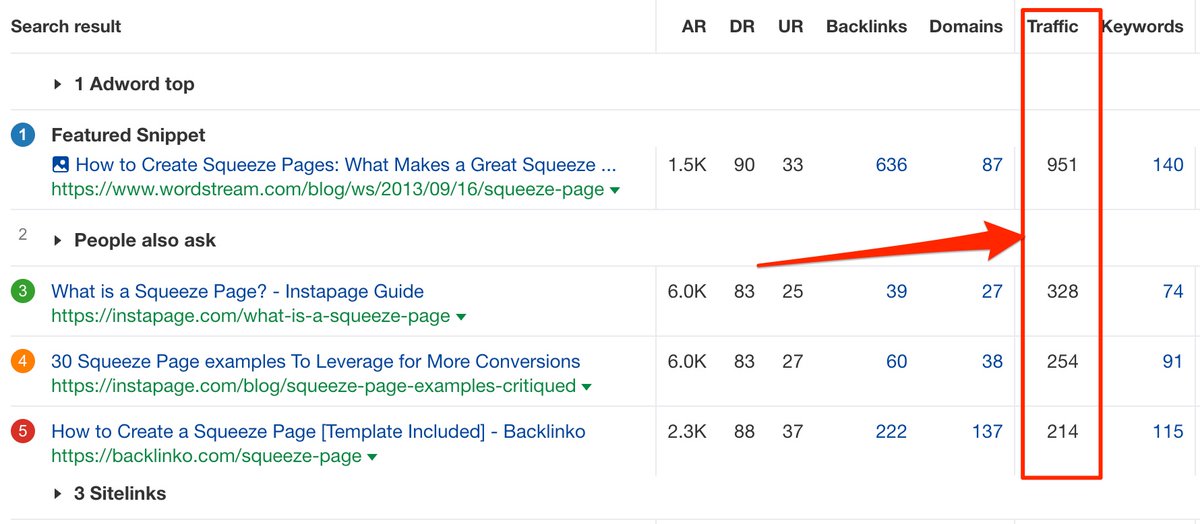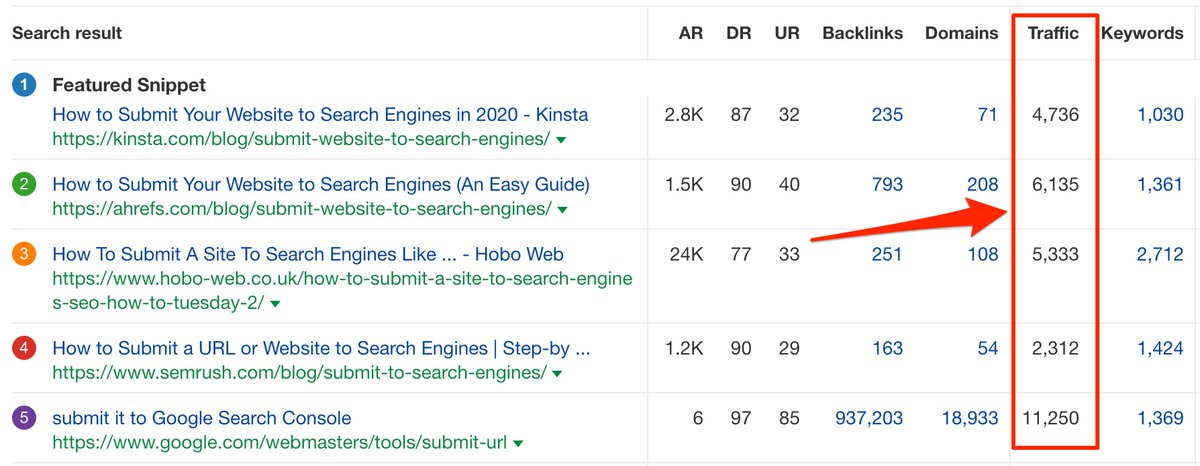
Long-tail keywords 🔑
Did you know there are two types of them?
1. Topical long-tail keywords
2. Supporting long-tail keywords
...and targeting the wrong type will likely lead to a waste of resources.
[more in the thread]
Did you know there are two types of them?
1. Topical long-tail keywords
2. Supporting long-tail keywords
...and targeting the wrong type will likely lead to a waste of resources.
[more in the thread]
First, let's address the common mistake in the definition of "long-tails."
Long-tail keywords are NOT defined by their length in words, their specificity or propensity to convert.
They got their name from their position on the so-called "search demand curve:"
Long-tail keywords are NOT defined by their length in words, their specificity or propensity to convert.
They got their name from their position on the so-called "search demand curve:"

Long-tail keywords are those that have very low search volumes.
...whether they have 1 word in them or 5.
Yes, MOST 1-word keywords have high search volumes
& MOST 5+ word keywords have low SV.
But not all (see the attached pic)
...whether they have 1 word in them or 5.
Yes, MOST 1-word keywords have high search volumes
& MOST 5+ word keywords have low SV.
But not all (see the attached pic)

Now, onto the two types:
[ 1 ] Supporting long-tails
“Best healthy treats for dogs” gets 100 searches/mo, so it is clearly a long-tail.
But there are some vastly more popular search queries that mean basically the same thing:
[ 1 ] Supporting long-tails
“Best healthy treats for dogs” gets 100 searches/mo, so it is clearly a long-tail.
But there are some vastly more popular search queries that mean basically the same thing:

And if you put each of these keywords into Google, you'll notice that the same set of pages is ranking on the first page for each of them.
(You can also use this cool trick in @ahrefs Keywords Explorer, which I shared earlier)
(You can also use this cool trick in @ahrefs Keywords Explorer, which I shared earlier)
https://twitter.com/timsoulo/status/1326421057222406145
What this means is that a page that ranks well for “healthy dog treats” (6.8k searches) will automatically rank well for all the long-tail variations of this search query and get search traffic from them.
i.e. "supporting keywords"
i.e. "supporting keywords"
Thus, if you target a long-tail keyword “best healthy treats for dogs” (100 searches/mo) you will eventually find yourself competing with pages that target a broader “healthy dog treats” (6.8k searches/mo) keyword.
😬
😬
But how do you know if a long-tail keyword you’re looking at is a part of a broader topic or not?
We got you! 😉
In @ahrefs Keywords Explorer there's a feature called "Parent topic:"
We got you! 😉
In @ahrefs Keywords Explorer there's a feature called "Parent topic:"

What this feature does is pulls the #1 ranking page for a given keyword..
..and then looks up which of the other keywords that this page ranks for brings it the most clicks.
(It's not always perfect ofc, but its good enough in most cases. 🙃)
..and then looks up which of the other keywords that this page ranks for brings it the most clicks.
(It's not always perfect ofc, but its good enough in most cases. 🙃)
Now let's talk about the second type of long-tail keywords:
[ 2 ] Topical long-tails
As the name suggests, these search queries represent unique "unpopular" topics, rather than unpopular ways to search for something popular.
[ 2 ] Topical long-tails
As the name suggests, these search queries represent unique "unpopular" topics, rather than unpopular ways to search for something popular.
For example..
“fly bites on dogs ears” gets 300 searches/mo
And, according to Keywords Explorer, it does not have a broader Parent topic.
Which means that this keyword represents a unique topic and should be addressed with a dedicated page.
“fly bites on dogs ears” gets 300 searches/mo
And, according to Keywords Explorer, it does not have a broader Parent topic.
Which means that this keyword represents a unique topic and should be addressed with a dedicated page.

So these were the 2 types of long-tails which you might encounter while doing keyword research.
But, to be fair, the reality is a little more nuanced than these 2 types 😅
In some cases, what seems like a supporting keyword might actually be treated as a unique topic too.
But, to be fair, the reality is a little more nuanced than these 2 types 😅
In some cases, what seems like a supporting keyword might actually be treated as a unique topic too.
So if you'd like to dig a little deeper into the concept of long-tail keywords, what makes them so desirable & how to leverage them...
I invite you to read my latest post at Ahrefs Blog:
ahrefs.com/blog/long-tail…
(and plz don't forget to RT this thread if you enjoyed it 🙏🙂)
I invite you to read my latest post at Ahrefs Blog:
ahrefs.com/blog/long-tail…
(and plz don't forget to RT this thread if you enjoyed it 🙏🙂)
• • •
Missing some Tweet in this thread? You can try to
force a refresh









